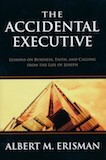Relationships Make All the Difference
Daily Reflection / Produced by The High Calling
Paul, an apostle of Christ Jesus by the will of God, To God’s holy people in Ephesus, the faithful in Christ Jesus. (NIV)
Ephesians 1:1
Before we move on from the first verse of Ephesians, I want to pause for a moment and note something that is incredibly obvious and yet easily missed. I'm talking about the relational dynamics of the first verse. There is so much going on here relationally!
First, there is Paul's introduction of himself in relational terms. He is an apostle, which implies a sender and those to whom he was sent. The sender is made explicit in the phrases "of Christ Jesus by the will of God." Paul is an apostle in relationship to Christ, who confronted him on the road to Damascus and revealed to him that he was Christ's own "chosen instrument" for ministry.
Second, there is the sheer fact of Paul's writing a letter to people, which is itself a relational act. It strengthens the bond between the apostle and those to whom he has been sent.
Third, the recipients of the letter are defined relationally. They are "God's holy people," literally "saints" or those set apart by God for God's purposes. They are people who have put their faith in Christ and who live in relationship with him.
Notice that Paul does not identify the letter recipients in terms of their relationship to him. He does not write to "my children in Christ" or "the church that I founded." Rather, he links the readers primarily to God and Christ. They are holy and faithful in relationship to God and because of his work in and among them. Moreover, through God, individual believers are joined to each other. This God-based relationship will be a major theme of Ephesians, as we shall see.
For now, I simply want to note the profoundly relational character of the first verse of Ephesians. It suggests that Christianity is not mainly a matter of believing the right things (though this is essential) or doing the right things (though this is also crucial), but rather of being in a deep, authentic, transformational relationship with God and God's people.
QUESTIONS FOR FURTHER REFLECTION: How do you define Christianity? How do you think of your own Christian life? Is it mainly a matter of thinking? Acting? Feeling? Or is it essentially, in your view, a network of relationships centered in the Triune God? Are you living out your faith in deep relationships with God and others?
PRAYER: Thank you, gracious God, for the reminder that my life as a Christian is most of all about my relationship with you and, through you, your people. Thank you for the fact that you have set me apart for yourself and your purposes. Thank you for your grace that opens the way for me to be in Christ.
Help me, dear Lord, to live out this reality each day. May I continually grow in my relationship with you. May I form deeper relationships with my brothers and sisters in Christ.
Today, I want to pray especially for those who receive these reflections and are feeling disconnected from you. Reach out to them in your grace. Embrace them in your love. May they experience the truth that their relationship with you is the center of their lives. And, then, Lord, help them to find a community of believers with whom to share your life. Amen.
P.S. from Mark: Thanks for sharing with me in this commentary! Before I sign off, I want to thank you for sharing with me in this commentary on Ephesians. If you're not sure what I'm talking about, you might want to check out my reflection from June 13, in which I invite my readers to join me in writing a commentary on Ephesians. Since I made that invitation, I have received a couple hundred contributions, in the form of comments on The High Calling and emails sent to me. I read every one of these and save them for future reference. They have already influenced how I understand the impact of Ephesians on your life. They have also encouraged me to dig deeper in the text of the letter. This is exactly the kind of community involvement I was hoping for. So, I simply want to say "Thanks" for your partnership in this work.






